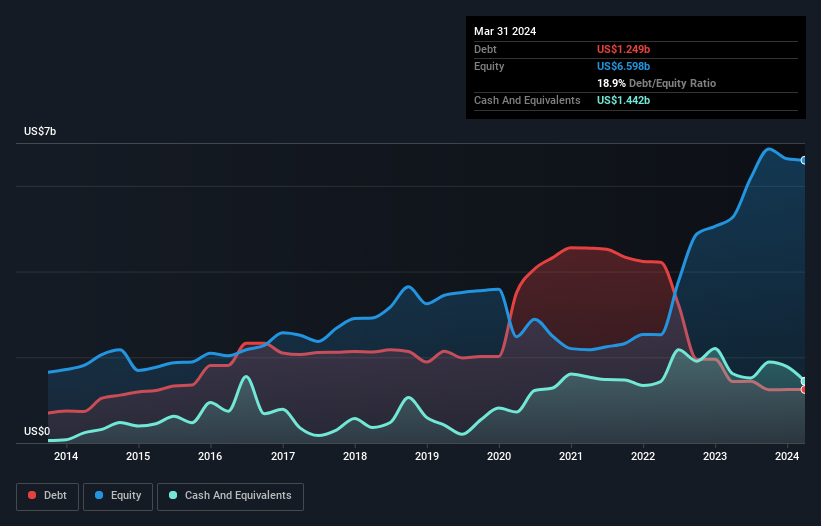- United States
- /
- Oil and Gas
- /
- NYSE:PBF
These 4 Measures Indicate That PBF Energy (NYSE:PBF) Is Using Debt Extensively

Warren Buffett famously said, 'Volatility is far from synonymous with risk.' When we think about how risky a company is, we always like to look at its use of debt, since debt overload can lead to ruin. As with many other companies PBF Energy Inc. (NYSE:PBF) makes use of debt. But should shareholders be worried about its use of debt?
When Is Debt A Problem?
Debt is a tool to help businesses grow, but if a business is incapable of paying off its lenders, then it exists at their mercy. Part and parcel of capitalism is the process of 'creative destruction' where failed businesses are mercilessly liquidated by their bankers. However, a more frequent (but still costly) occurrence is where a company must issue shares at bargain-basement prices, permanently diluting shareholders, just to shore up its balance sheet. Of course, plenty of companies use debt to fund growth, without any negative consequences. The first step when considering a company's debt levels is to consider its cash and debt together.
Check out our latest analysis for PBF Energy
What Is PBF Energy's Debt?
As you can see below, PBF Energy had US$1.25b of debt at March 2024, down from US$1.43b a year prior. However, its balance sheet shows it holds US$1.44b in cash, so it actually has US$192.9m net cash.

How Healthy Is PBF Energy's Balance Sheet?
Zooming in on the latest balance sheet data, we can see that PBF Energy had liabilities of US$3.78b due within 12 months and liabilities of US$3.43b due beyond that. Offsetting this, it had US$1.44b in cash and US$1.17b in receivables that were due within 12 months. So its liabilities total US$4.60b more than the combination of its cash and short-term receivables.
This deficit is considerable relative to its market capitalization of US$4.66b, so it does suggest shareholders should keep an eye on PBF Energy's use of debt. This suggests shareholders would be heavily diluted if the company needed to shore up its balance sheet in a hurry. Despite its noteworthy liabilities, PBF Energy boasts net cash, so it's fair to say it does not have a heavy debt load!
The modesty of its debt load may become crucial for PBF Energy if management cannot prevent a repeat of the 64% cut to EBIT over the last year. Falling earnings (if the trend continues) could eventually make even modest debt quite risky. The balance sheet is clearly the area to focus on when you are analysing debt. But ultimately the future profitability of the business will decide if PBF Energy can strengthen its balance sheet over time. So if you want to see what the professionals think, you might find this free report on analyst profit forecasts to be interesting.
Finally, a business needs free cash flow to pay off debt; accounting profits just don't cut it. PBF Energy may have net cash on the balance sheet, but it is still interesting to look at how well the business converts its earnings before interest and tax (EBIT) to free cash flow, because that will influence both its need for, and its capacity to manage debt. Over the most recent three years, PBF Energy recorded free cash flow worth 75% of its EBIT, which is around normal, given free cash flow excludes interest and tax. This free cash flow puts the company in a good position to pay down debt, when appropriate.
Summing Up
While PBF Energy does have more liabilities than liquid assets, it also has net cash of US$192.9m. The cherry on top was that in converted 75% of that EBIT to free cash flow, bringing in US$357m. So although we see some areas for improvement, we're not too worried about PBF Energy's balance sheet. There's no doubt that we learn most about debt from the balance sheet. But ultimately, every company can contain risks that exist outside of the balance sheet. For example, we've discovered 3 warning signs for PBF Energy (2 shouldn't be ignored!) that you should be aware of before investing here.
If, after all that, you're more interested in a fast growing company with a rock-solid balance sheet, then check out our list of net cash growth stocks without delay.
New: Manage All Your Stock Portfolios in One Place
We've created the ultimate portfolio companion for stock investors, and it's free.
• Connect an unlimited number of Portfolios and see your total in one currency
• Be alerted to new Warning Signs or Risks via email or mobile
• Track the Fair Value of your stocks
Have feedback on this article? Concerned about the content? Get in touch with us directly. Alternatively, email editorial-team (at) simplywallst.com.
This article by Simply Wall St is general in nature. We provide commentary based on historical data and analyst forecasts only using an unbiased methodology and our articles are not intended to be financial advice. It does not constitute a recommendation to buy or sell any stock, and does not take account of your objectives, or your financial situation. We aim to bring you long-term focused analysis driven by fundamental data. Note that our analysis may not factor in the latest price-sensitive company announcements or qualitative material. Simply Wall St has no position in any stocks mentioned.
Have feedback on this article? Concerned about the content? Get in touch with us directly. Alternatively, email editorial-team@simplywallst.com
About NYSE:PBF
PBF Energy
Through its subsidiaries, engages in refining and supplying petroleum products.
Undervalued with adequate balance sheet.
Similar Companies
Market Insights
Community Narratives



